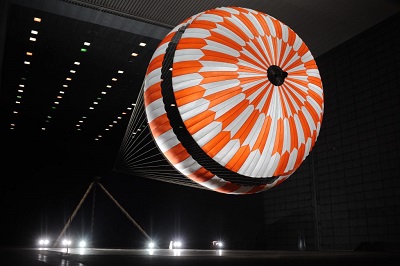Teijin Aramid announces that, with the successful launch of NASA’s Mars Perseverance Rover from Cape Canaveral in Florida, its Technora® high-performance fiber is again enabling space exploration. The premium para-aramid Technora® plays a critical role in the structure of the Rover’s landing parachute, developed by Airborne Systems and NASA’s Jet Propulsion Laboratory, which will be deployed during descent to Mars in February 2021.
On a mission to seek signs of past microscopic Martian life and gather rocks soil for its eventual return to Earth, the Mars Perseverance Rover is carrying the heaviest payload of any mission to the Red Planet yet. In view of this unprecedented challenge, the parachute system has undergone an extensive set of demanding tests. Specifically, the parachute system has proven it can support an inflation load of 31,751 kg (almost 70,000 lb). The challenging surface conditions on Mars include average temperatures of -63°C, frequent dust storms, and atmospheric electricity.

To ensure this unique parachute system performs under the extreme conditions of the descent to Mars, 60 kg (132 lb) of Technora® are incorporated into the parachute’s suspension cords. Technora® is also used in the parachute riser. Indeed, this mission builds on the proven technologies and systems of previous Mars Rover expeditions, which also carried Technora®. In particular, Technora® was used on the Mars Curiosity Rover in 2012, where the parachute’s suspension cords had to withstand a 9G force during the landing – about 27,000 kg (59,525 lb).
Teijin Aramid is a subsidiary of the Teijin Group and world leader in aramids. Its aramid products Twaron®, Teijinconex®, Technora® and its ultra-high molecular weight polyethylene (UHMW-PE) Endumax® are renowned for their strength, sustainability, safety, heat resistance and low weight and are used in different applications and markets including automotive, ballistic protection, marine, civil engineering, protective clothing, ropes, fiber optic cables and oil & gas. These high-performance materials are produced in the Netherlands, Thailand and Japan.














